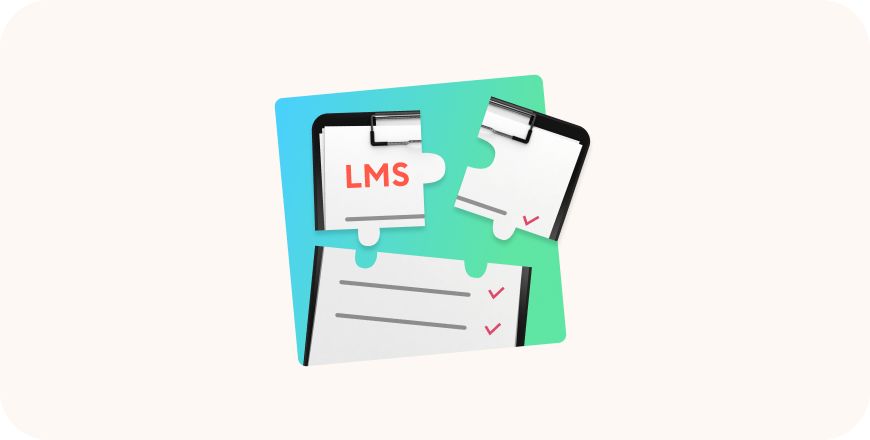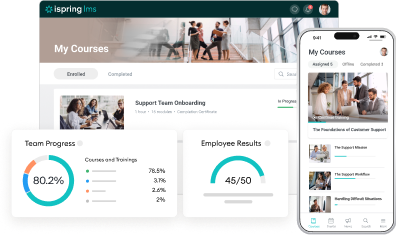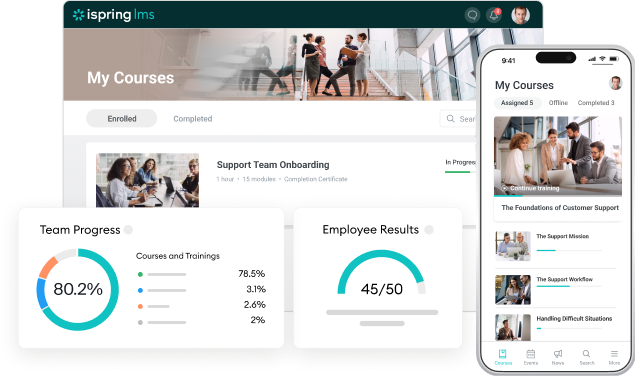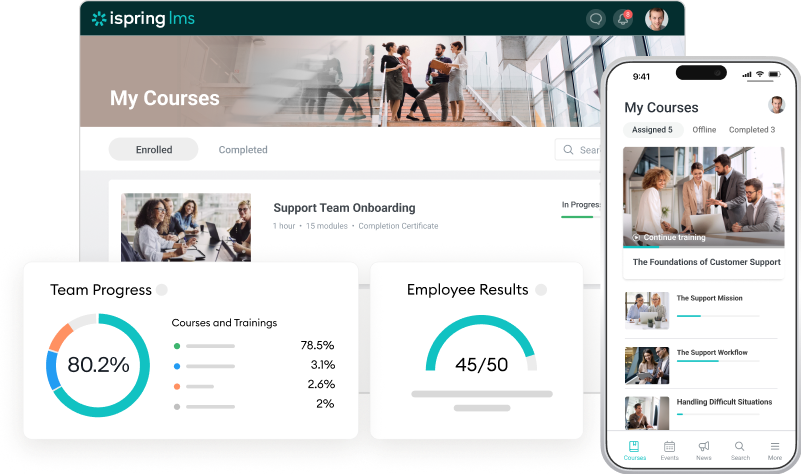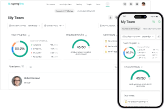15 Essential Questions to Ask LMS Vendors

Want to know a secret? Companies that invest in learning absolutely crush it. They’re much more productive and profitable. But here’s the catch: picking the right training tools is crucial. If you ask the right questions when choosing, you’ll set your team up for success.
This guide will help you master choosing the right LMS. We’ll cover the essential questions to ask LMS vendor representatives at each step of your decision-making process. From the first call to the final demo, we’ll provide you with the LMS evaluation survey questions that experts use.
By the end of this guide, you’ll feel confident and ready to choose an LMS that meets your needs and grows with your organization. Let’s explore 15 key questions to ask when choosing an LMS. They’ll help you find the best fit and set you up for success.
Questions to Ask an LMS Vendor During the First Call
(Intro Call)
When evaluating a new LMS, it’s crucial to have a list of LMS-related questions to ask. The first call with an LMS vendor is like a first date: it’s your chance to get a feel for their offering and see if there’s potential for a long-term relationship. But unlike a first date, you don’t want to play it cool. This is the time to ask detailed questions to see if their solution might be a good match for you.
1. What makes your LMS stand out from competitors?
This question serves a dual purpose. First, it gives the vendor a chance to highlight their unique selling points. Are they proud of their user-friendly interface? Their advanced analytics? Their industry-specific features?
Listen carefully to how they position themselves in the market. Secondly, it provides insight into how well they understand the competitive landscape. A vendor who can clearly explain their strengths compared to their competitors is probably more aware of industry trends and challenges.
2. Can you provide an overview of your pricing model?
This can be tricky because companies charge in different ways. Some make you pay for each person who uses it. Others have set prices based on how many people use it. And some just charge one big fee for everything.
When you’re talking to an LMS company representative, ask them to explain how they charge. Also, find out if there are any extra costs they don’t tell you about right away. You might not get an exact price yet, but knowing how they charge will help you see if you can afford it.
3. What kind of support do you offer during and after implementation?
Do they offer dedicated account managers? What are their support hours? Is there an extra charge for premium support? The quality of support can impact your LMS experience significantly, especially during setup.
Josh Bersin, an industry expert, says: “The first call is a chance to evaluate both the product and the company. Look for vendors who ask about your needs, not just push their features.”
How flexible and customizable is your LMS?
Every organization has its own needs, and your LMS should meet them. Ask about branding options, custom learning paths, and how they integrate with your current systems. A good LMS should fit your needs now and as you grow. This way, it stays useful for a long time.
5. Can you share some success stories of clients that are similar to our company?
This can give you useful information on how the LMS works in actual situations like yours. Examine what experience and results they talk about. Do these match what you want to achieve?
Remember, this first call is just the start. Use it to see if the vendor understands your needs and if their solution fits well. Don’t hesitate to ask for more details or clarification — good vendors will appreciate your questions and provide extra information.
Questions to Ask an LMS Vendor During a Demo (Demonstration)
The LMS demo is where things get interesting. You get to see the system in action and imagine how it might work for your organization. But don’t just watch. Prepare a list of questions to ask during the LMS demo to ensure you cover all important aspects. Ask detailed questions and request demonstrations of features that are important to you. This is your time to learn more.
Start by focusing on the user interface.
6. How user-friendly is the interface for both administrators and learners?
Ask to see how to perform everyday tasks. Watch how admins make new courses. See how easy it is for learners to use. Count how many clicks each task takes. A good LMS should be easy for everyone to use. If it’s too difficult, people won’t use it, even if it has lots of cool features.

The interface of iSpring LMS for administrators and users
7. What reporting and analytics capabilities does your LMS offer?
Tracking and analyzing learning outcomes is very important. Ask to see their normal reports. Check if you can make your own reports too. Is it easy to see who finished courses? Can you check the test scores? How can you tell if people are using the system a lot?
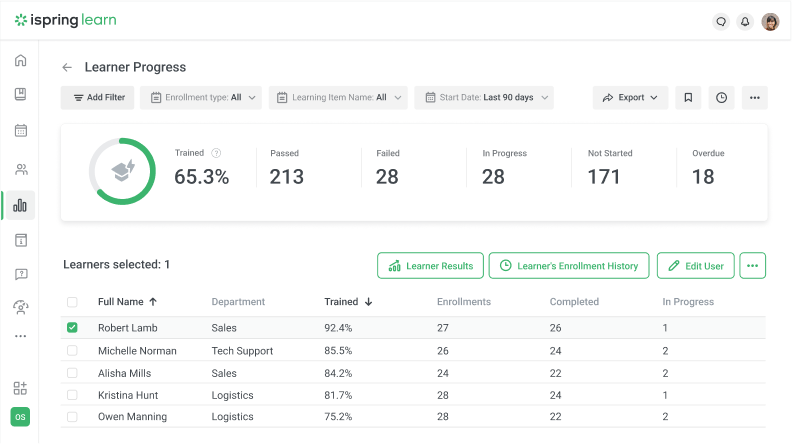
An example of the Learner Progress report in iSpring LMS
Good reports can show you if your training is working well. They can also help prove to bosses that the LMS is worth the expenditure.
8. Can you show us how content creation and management work in your system?
Content is key in any LMS, so pay attention to how content creation and management work. Ask to see a demo of the content creation tools. Is it easy to make a new course? Can you import existing content quickly? Does it support different media like videos, interactive elements, and quizzes?
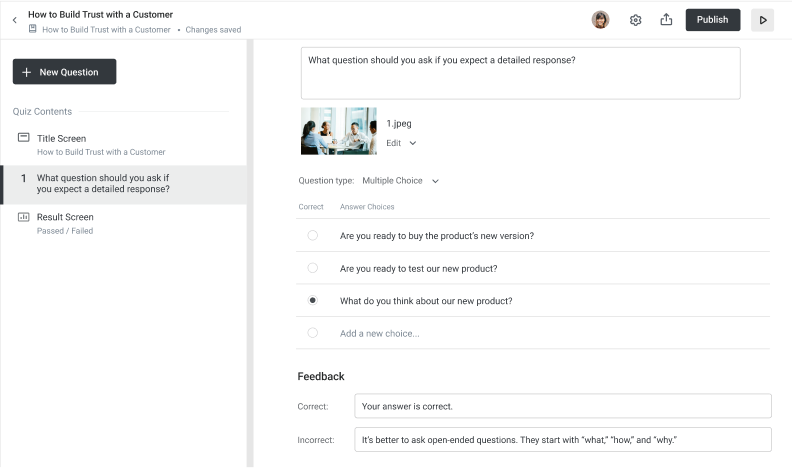
Understanding these steps helps you see how much time and effort you’ll need to manage content.
Dr. Jane Hart, Founder of the Centre for Learning & Performance Technologies, says: “Watch the user experience during the demo. If it’s confusing for you, it will be for your learners too.”
9. How does the LMS handle different types of learning content?
Modern learners want more than just reading or watching content. They expect to interact, work together, and share what they know. Features like discussion forums, group projects, and quizzes help keep them engaged.
Tools that allow learners to collaborate and communicate make the experience more active and interesting. Instead of just consuming content, they can participate, ask questions, and learn from others. This makes the learning process more effective and enjoyable.
10. What features are available for learner engagement?
Ask about tools like discussion forums, peer reviews, or ways to share user-generated content. These social features can make learning more dynamic and effective.
During the demo, don’t be afraid to ask for examples that match your needs. If compliance training is important, ask how the LMS handles certifications. If you have a global team, check if the LMS supports different languages and localization.
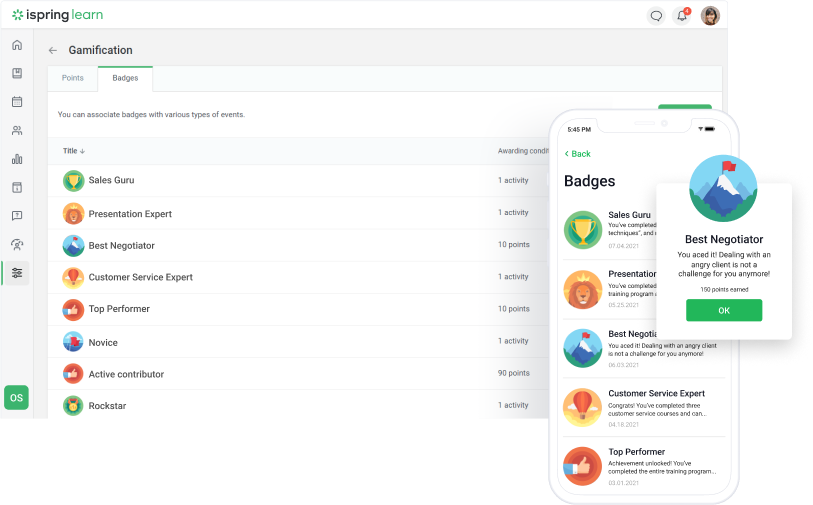
Gamification feature in iSpring LMS
Remember, a good demo should feel like a discussion about how the LMS fits your needs, not just a sales pitch. Take notes, ask for a recording, and include key people from your team to get a comprehensive view of what the system can do. Use these LMS demo questions to guide your evaluation.
Exploring LMS options can be overwhelming, but it’s all about finding the right fit for your team. While you’re looking, check out iSpring LMS. It’s a great chance to chat with our experts, see the system in action, and figure out if it’s the right tool for your learning goals.
Questions to Ask an LMS Vendor During the Final Interview
As you get closer to choosing your LMS, start asking more detailed questions. It’s time to address any concerns and ensure the LMS is the right fit for your organization.
Begin by asking about the setup process.
11. What is the implementation process like, and what will we need?
Don’t forget LMS implementation questions about timelines and needed resources. Ask for a clear timeline and find out what your team needs to do. Will your IT team need to be involved? How long does the setup usually take? Knowing these details helps ensure a smooth transition and prepares you for the launch.
12. How does your LMS work with other systems we use?
LMS integration questions ensure that the new system will work with your existing tools. Your LMS should work well with other systems you use, like HR or content management tools. Ask if the LMS can connect with these systems. A good integration makes things easier for both admins and learners by simplifying workflows and creating a smoother experience.
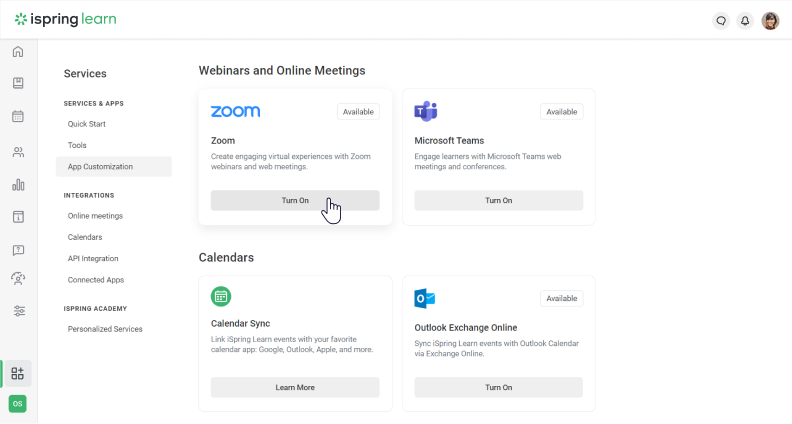
Example of integrations available in iSpring LMS
13. What security measures are in place to protect our data?
Data security is very important, especially for sensitive employee information. Ask technical questions about security, updates, and system requirements. Ask how they keep your data safe, like using encryption, and where they store it.
Also, check if they follow rules like GDPR (a law in Europe that protects personal data) or HIPAA (a U.S. law that keeps health data private). Knowing these details will help you be sure that your data is secure and that the LMS meets your company’s security needs.
14. How do you handle system updates and new features?
Ask the vendor how they handle updates and new features. How often do they release updates? How are they communicated and put into place? Are updates included in your subscription, or do they cost extra?
Also, ask about plans for new features. This will show you how the LMS will evolve and if it fits your organization’s future needs.
Craig Weiss, CEO of The Craig Weiss Group, says: “The final interview is your chance to find any issues. Don’t hesitate to ask tough questions about setup, support, and future upgrades.”
15. Can you explain how your customer support works?
As with any good relationship, even the best systems can have their ups and downs. It’s important to understand the vendor’s support process to ensure long-term success.
As you approach the end of your selection process, think of it as a first date. Have they shown how well their LMS aligns with your goals and needs? Are they open to working with you on any aspects where their system might not be a perfect match?
Remember, choosing an LMS is like finding a partner for your organization’s learning journey. The right vendor should feel like a perfect match—a company that’s dedicated to your success and ready to support you every step of the way.
FAQ
What’s the typical timeline for selecting an LMS?
A: The LMS selection process typically takes about 3 to 6 months. Yes, it’s not exactly a walk in the park. The timeline can vary depending on your organization’s size and specific needs. Some companies breeze through it, while others take their sweet time to dot the i’s and cross the t’s.
What’s the difference between a cloud-based and a self-hosted LMS?
A: Cloud-based and self-hosted LMSs are two different animals. A cloud-based LMS is hosted on the vendor’s servers and accessed via the Internet. It’s usually a piece of cake to set up and maintain. On the flip side, a self-hosted LMS is installed on your own servers. This gives you more control, but you’ll need to roll up your sleeves and handle the nitty-gritty yourself. The choice boils down to whether you want convenience or control.
Do we really need this mobile learning thing?
A: Well, in our always-on-the-go world, it’s becoming pretty crucial. Think about it: learning while waiting for your coffee, or during your commute. That’s the beauty of mobile learning. People love having options and flexibility, so yes, it’s definitely worth considering.
What other tools should play nice with our LMS?
A: Think about the tools you use every day. Your HR system, those video calls you can’t escape, and maybe your customer database. A good LMS should fit into your digital world like a hand in a glove.
How do we keep our shiny new LMS from gathering digital dust?
A: First, make it super easy to use. No one likes a complicated system, right? Then, show people how it will improve their work life. Train them well, and why not ask for their opinion when choosing? People like to be heard!
Live classes vs. learn-when-you-want: what’s the scoop?
A: It’s like choosing between a live concert and a playlist. Live learning is real time, like a virtual class. Learn-when-you-want lets people study when it suits them best. The best LMS? It does both!
How often should we check if our LMS is still cutting it?
A: Think of it like a check-up. Give it a quick once-over every year. Then, every 3–5 years, do a deep dive. Tech moves fast, and you don’t want to be left in the dust, right?
Conclusion: Making the Right Choice
As you review the answers to your LMS survey questions and interact with different vendors, think of it as getting to know a potential partner. Look at the features and also the relationship you’re building. The best LMS vendor should feel like part of your team, dedicated to your success, and ready to support you.
Don’t rush the process. Just as you wouldn’t rush into a relationship, take your time. Involve key people, test the system if you can, and see how the LMS fits into your learning and development strategy. Creating a scorecard based on your top criteria can help you compare options.
Finally, trust your instincts. While features and pricing are important, how well you connect with the vendor and their understanding of your needs matter, too. The right LMS should meet your technical needs and fit well with your organization’s culture and values.
Choosing the right LMS is like finding the perfect match. It takes careful thought and detailed evaluation. LMS evaluation questions guide you when comparing different options. By asking LMS vendor representatives the right questions, you set yourself up for success. You’re looking for an LMS that not only meets your current needs but can also grow with your organization.
With these questions and insights, find the LMS that will enhance your organization’s learning. The perfect match is out there, and with the right approach, you’ll find it. Happy hunting!



